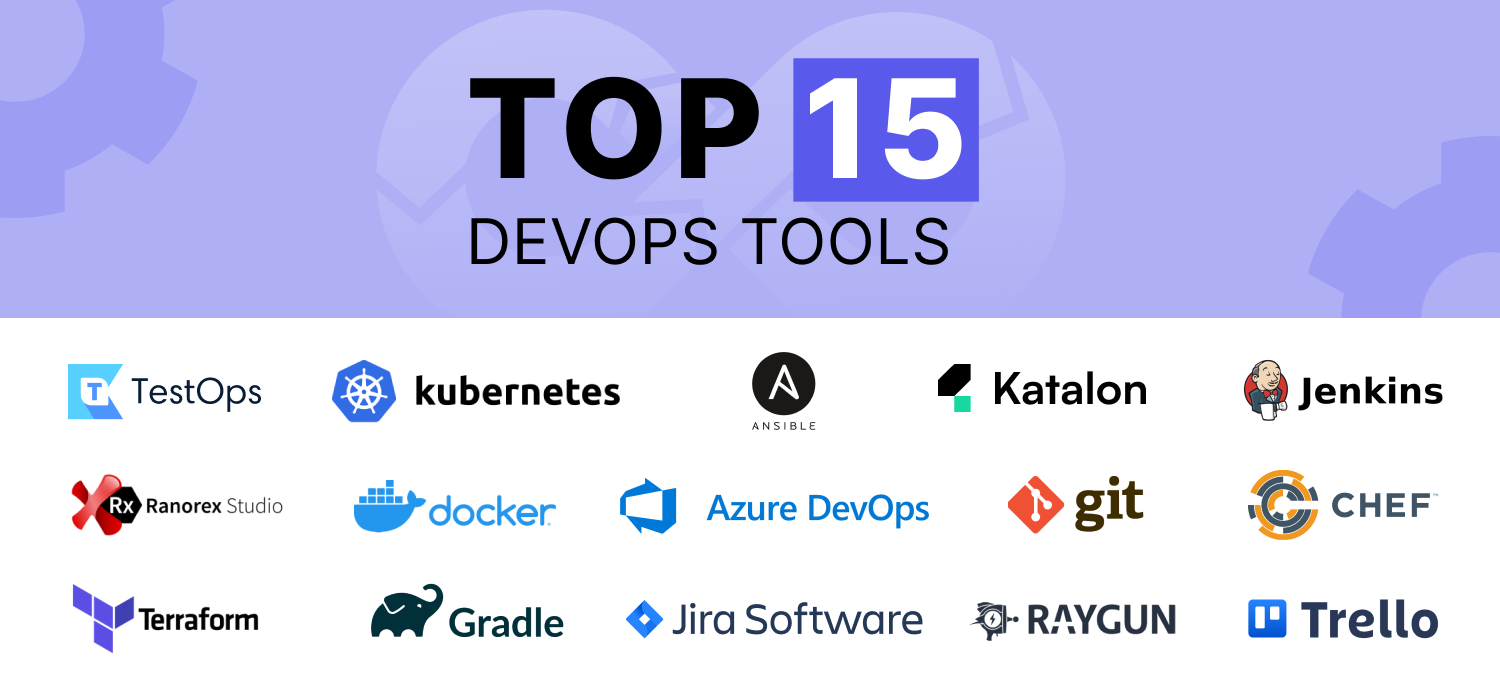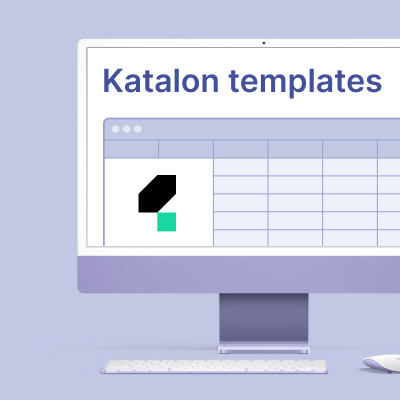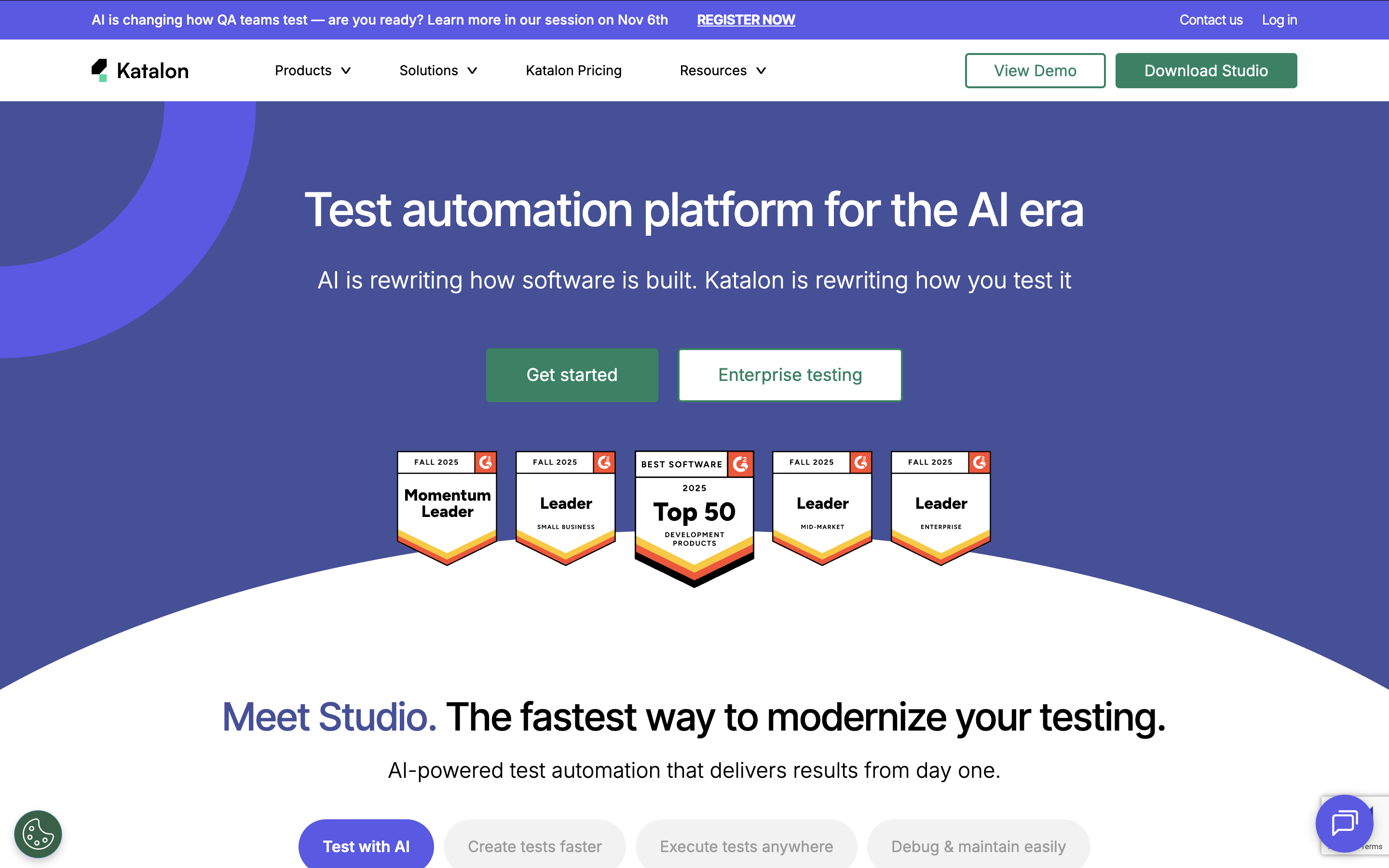15 Best DevOps Tools for Software Teams [Free Evaluation Template]
Learn with AI
 DevOps is a practice, not a tool, but tools are needed to implement it. Breaking down walls of communication and creating visibility and trust across all the teams involved in delivering software and technology is challenging. The right tools make the automation and integrations needed across functional teams seamless, open, and scalable.
DevOps is a practice, not a tool, but tools are needed to implement it. Breaking down walls of communication and creating visibility and trust across all the teams involved in delivering software and technology is challenging. The right tools make the automation and integrations needed across functional teams seamless, open, and scalable.
This article looks at the top CI/CD, automation, orchestration, and other DevOps pipeline tools to give you a detailed list of our Top 15 DevOps tools in 2025.
How to choose the right DevOps tools
You can’t order DevOps in a box. No one tool, and no single vendor, can provide all the capabilities needed to support a DevOps practice or their pipeline. But there are some key areas to consider when choosing tools and products for your organization’s needs and specific DevOps goals. Those goals typically vary according to the organization’s structure, operations, and environment.
Read more: DevOps Lifecycle: Definition & Key Components
When it comes to choosing the right tools for any given project or organization, there are a few things to keep in mind:
- Application and technology infrastructure — What are your application/software platforms? What infrastructure technologies power those platforms? Can the tool work with applications and/or infrastructure hosted across cloud, local, or hybrid environments?
- Developer process integration — Can the tool integrate with your current development tools, IDEs, and/or ALM or project management platform?
- Open and broad integration — Can the tool integrate with various DevOps pipeline technologies such as:
- Testing frameworks (e.g., Selenium, TestNG, Jest, JUnit, Mocha, etc.)
- Communication platforms (e.g., Slack, Teams, etc.)
- Project management systems (e.g., Jira)
- CI & CD (Jenkins, CircleCI, GitHub)
- Easy of use, scalability — Make sure your team can easily learn and implement the tool and ensure the tool can scale as your team’s capabilities improve and your organization grows.
- Licensing vs. cost models — Is the tool open-source or commercial? sure to consider the costs beyond just licensing. Free tools may be free in the licensing cost but expensive in the resources needed to deploy and maintain them. Is a product licensed by the seat or by “the tick”? Simple and straightforward licensing combined with an honest approach to non-license-related operational costs make planning easier and removes future roadblocks to rolling out your DevOps pipeline across projects and teams.
Top 15 DevOps tools
Best test orchestration tools


1. Katalon TestOps
Katalon TestOps is an orchestration platform for automated testing that unites test management, planning, execution, and quality analytics. TestOps connects the team with feedback loops that are instant, actionable, and insightful for both QA, product, and DevOps teams.

 Feature highlights:
Feature highlights:
- Easy-to-use UI with reporting-centric features
- Seamless integration with popular testing frameworks/tools (Katalon Studio, Selenium, TestNG, JUnit, etc.) CI/CD systems (Bamboo, Jenkins, Azure DevOps, CircleCI, etc.) and environments (Kubernetes, Dockers, Kobiton, etc.) View Katalon Integrations Ecosystem
- Integrations with management platforms (Jira, Slack), SDK, and REST APIs that supercharge effective team collaboration
- Real-time data monitoring and customizable alerts to act early on any rising issues
- Full picture on quality through shareable dashboards with metrics that matter most to your team
- Robust failure analysis of test cases through rich execution reports with HAR files, videos, screenshots, execution logs, error messages, and artifacts
Best development environment tools
2. Kubernetes

Kubernetes is an open-source system for automating deployment, scaling, and management of containerized applications. It schedules workloads onto compute cluster nodes and actively manages them to ensure that their state matches the users’ intentions.

Feature highlights:
- Run anywhere: on-premise, hybrid, or public cloud
- Automated rollouts, rollbacks, and scaling
- Service Discovery and load balancing
- Storage orchestration
- Helm charts to deploy multiple projects with the same customized applications
- Largest community among container orchestration tools
Visit Kubernetes | G2 Reviews
Pricing: Contact sales
3. Docker
The Docker technology stack allows DevOps teams to create, ship, and operate container-based distributed applications. This platform enables enterprises to develop applications, exchange container images, and collaborate with users by allowing them to build programs from components.

Feature highlights:
- Provide a consistent and isolated environment that is cost-effective due to its rapid deployment, trial run, and rollback capabilities.
- Package applications to run in a variety of environments consistently, from on-premise to AWS, Azure, Google, etc.
- Image management made simple with a private registry for storing, managing and configuring image caches as well as a public registry for sharing and collaborating with your community of users
Visit Docker | G2 Reviews
Pricing: Free — $5/license/month
Best automation testing tools
4. Katalon Studio
Katalon Studio is a low-code and all-in-one test automation tool for web, API, mobile, and desktop (Windows). It is a popular alternative to replace self-built frameworks, reduce time spent creating, running, maintaining, and getting reports from automated tests.
 Feature highlights:
Feature highlights:
- Low-code and scripting test creation modes with Record & Playback, built-in keyword libraries, drag-and-drop, and Script Mode (Java and Groovy supported)
- AssertJ support to create fluent assertions in BDD style
- Data-Driven Testing (Excel, CSV, PostgreSQL, MySQL, Oracle SQL, SQL Server) and parallel execution for wider coverage
- Various testing report formats (HTML, PDF, CSV, JUnit, etc.) and Report History to store and track results over time
- Built-in Debugging Mode, Test Artifact/Desired Capabilities Sharing, and Test Object Refactoring for stress-free maintenance
- Native CI/CD (Azure DevOps, Bamboo, Bitbucket, CircleCI, Jenkins, GitHub Action, GitLab, etc.) and ALM (Jira) integrations
- Import projects from Selenium, Selenium IDE, SoapUI, Swagger (2.0 & 3.0), Postman, WSDL, and WADL
- Free test automation courses and tool tutorials on Katalon Academy
Visit Katalon Website | Pricing | G2 Reviews
Pricing: Free and flexible paid plans
5. Ranorex Studio
Ranorex Studio is a test automation tool to test desktop, web, and mobile applications. It is simple for beginners to use but powerful for experts, thanks to its reliable capture-and-replay tool, drag-and-drop UI objects, and code modules for keyword-driven testing.
 Feature highlights:
Feature highlights:
- Access the Ranorex core automation framework entirely in C# and VB.NET without leaving the development environment
- Utilize the comprehensive XML-based test report to view test results and monitor project progress
Visit Ranorex Studio Website | G2 Reviews
Pricing: Contact sales
Best Continuous Integration & Deployment (CI/CD) tools
6. Jenkins
Jenkins is a DevOps tool for monitoring the execution of repetitive tasks. It is one of the best tools for software deployment due to the hundreds of plugins available to assist with creating, delivering, and automating any project. Feature highlights:
Feature highlights:
- View builds and branches of code through a simple, clean GUI
- Provide an excellent history of the build and the locations of any errors that may occur.
- +2,000 plugins that simplify configuration and customization to meet specific requirements.
Visit Jenkins Website | G2 Reviews
Pricing: Free
7. Azure DevOps

Azure DevOps is a Microsoft platform that enables the development and deployment of software using an end-to-end DevOps toolchain. Additionally, it integrates with the majority of industry-leading tools, making it a great choice for orchestrating a DevOps toolchain. Feature highlights:
Feature highlights:
- A large collection of connectors, integrations, and extensions
- Office 365 integration (Teams and Sharepoint)
- Numerous training/documentation resources, and a sizable user community
- IDE integration with MS Visual Studio
- End-to-end capabilities from IDE to cloud execution
Visit Azure Devops Website | G2 Reviews
Pricing: Free — $200/credit
📚Read more: Best 14 CI/CD Tools
Best configuration management tools
8. Ansible
Ansible is the preferred DevOps tool for orchestration, automation, configuration, and managing IT Infrastructures. The benefits of Ansible in DevOps are to respond and scale in pace with the demand. Feature highlights:
Feature highlights:
- 750+ built-in modules for automating, configuring, deploying, and orchestrating the IT infrastructure
- Agentless system for easier management and storage
Visit Ansible Website | G2 Reviews
Pricing: Contact sales
9. Chef
Chef enables users to express infrastructure, security policies, and application lifecycles as code, modernizing any application’s development, packaging, and delivery to any platform.

Feature highlights:
- Deploy simple or full system changes out to a large group of servers with little human interaction
- Support a broad range of technologies, including difficult-to-automate legacy desktop applications.
Visit Progress Chef Website | G2 Reviews
Pricing: Contact sales
Best version control systems
10. Git
Git is a free and open-source distributed version control system designed to handle everything from small to very large projects with speed and efficiency. Feature highlights:
Feature highlights:
- Provide various options for managing code repositories and collaboration between team members to manage codebases and branches
- Direct integration with IDEs like Eclipse, VS Code, and IntelliJ
Visit Git Website | G2 Reviews
Pricing: Free
Best Infrastructure-as-a-Code tools
11. Terraform
Terraform is an open-source infrastructure-as-a-code software tool that enables the management of hundreds of cloud services via a consistent CLI workflow. Feature highlights:
Feature highlights:
- Variables can be created to make the templates generic so that they can be reused for different environments or resources
- Auto-rollback feature upon failure
Visit Terraform Website | G2 Reviews
Pricing: Free — $20/user/month
Best builds and codes management tools
12. Gradle
Gradle Build Tool is the most popular build tool for open source JVM projects on GitHub. Many popular projects have migrated from Maven to Gradle, with Spring Boot being a prominent example. Feature highlights:
Feature highlights:
- Simply-added dependencies and plugins to facilitate multi-module builds.
- Widespread adoption; included in all major integrated development environments (IDEs) such as IntelliJ idea and Eclipse
- Short and clean build configurations due to the flexible DSL based on the Groovy programming language
Visit Gradle Website | G2 Reviews
Pricing: Free
Best application lifecycle management tools
13. Jira
Jira is a well-known platform for tracking issues and managing projects. Jira is available as a SaaS solution or as an on-premises solution. Feature highlights:
Feature highlights:
- Agile software development with Scrum and Kanban boards
- Utilize a drag-and-drop interface to create automation rules
- Integrate seamlessly with Bitbucket, GitHub, and Microsoft Teams to automate your workflow
Visit Atlassian Website | G2 Reviews
Pricing: Free — $75/month
14. Trello
Trello is a collaborative visual tool that helps your team develop a shared perspective on any project in a fun, flexible, and rewarding way. Feature highlights:
Feature highlights:
- A variety of board systems for specified experiments and customizations
- Have multiple boards working on different projects simultaneously, each with its own set of to-dos
- Collaborate in real-time with teams through dashboards, ensuring that each project receives the attention it requires
Visit Trello Website | G2 Reviews
Pricing: Free — $4/user/month
15. Raygun
Raygun is a cloud-based platform that monitors your web and mobile applications for errors, crashes, and performance. With Raygun’s robust suite of tools, teams can gain complete visibility into the issues their users encounter, down to the code level. Feature highlights:
Feature highlights:
- Simple logging tool for.NET applications
- Crash Reporting and User-tracking features to help notify about real-time errors.
- APM tool for application performance and the error management workflow
Visit Raygun Website | G2 Reviews
Pricing: Free — $4/month
Prior to selecting the appropriate DevOps tools, it is necessary to assess the current development process requirements, needs, strengths and weaknesses, and maturity. If tools are provided by multiple providers, consideration must be given to their interoperability. It is often suggested to use an integrated suite to ensure a seamless process.
|
FAQs on DevOps tools
1. Can one DevOps tool cover everything in the pipeline?
No. There is no single tool or vendor that can provide all the capabilities required for a DevOps pipeline. Successful DevOps implementation relies on a toolchain that spans CI/CD, testing, orchestration, infrastructure, monitoring, and collaboration tools.
📖 Refer to: Section: “How to choose the right DevOps tools”
2. What should I consider when choosing DevOps tools for my team?
Key considerations include:
-
Compatibility with your infrastructure and tech stack
-
Integration with development tools, IDEs, and CI/CD systems
-
Ease of use and scalability as your team and system grow
-
Licensing vs. operational costs
-
Support for cross-functional collaboration
📖 Refer to: Section: “How to choose the right DevOps tools”
3. What is Katalon TestOps and how does it support DevOps?
Katalon TestOps is an orchestration platform for automated testing. It brings together test management, execution, and analytics in one interface, offering real-time feedback loops, integration with CI/CD systems, and rich test reporting to empower QA, DevOps, and product teams.
📖 Refer to: Section: “Katalon TestOps” under “Best Test Orchestration Tools”
4. Which DevOps tools are best for CI/CD automation?
Popular CI/CD tools include:
-
Jenkins – Open-source automation with 2,000+ plugins
-
Azure DevOps – End-to-end Microsoft pipeline integration
-
Both tools offer extensive pipeline orchestration, build history, and IDE integration for efficient delivery workflows.
📖 Refer to: Section: “Best Continuous Integration & Deployment (CI/CD) tools”
5. What tools are recommended for infrastructure management and container orchestration?
Top infrastructure and container tools include:
-
Kubernetes – Container orchestration across any environment
-
Docker – Container-based application deployment
-
Terraform – Infrastructure as code with reusable templates
-
Ansible – Agentless configuration and automation
📖 Refer to: Sections: “Best development environment tools”, “Best Infrastructure-As-A-Code tools”, “Best configuration management tools”
6. Which tools help manage the application lifecycle in DevOps?
Tools like Jira and Trello are used for tracking, planning, and managing software projects.
-
Jira supports Agile workflows and integrates with code repositories.
-
Trello offers visual project management using boards and cards.
📖 Refer to: Section: “Best application lifecycle management tools”
7. Are there DevOps tools that help with testing automation?
Yes. Tools like:
-
Katalon Studio – All-in-one, low-code automation testing for web, API, mobile, and desktop
-
Ranorex Studio – UI-driven automation for multiple platforms
These tools support parallel testing, debugging, and integration with CI/CD and ALM tools.
📖 Refer to: Section: “Best automation testing tools”







